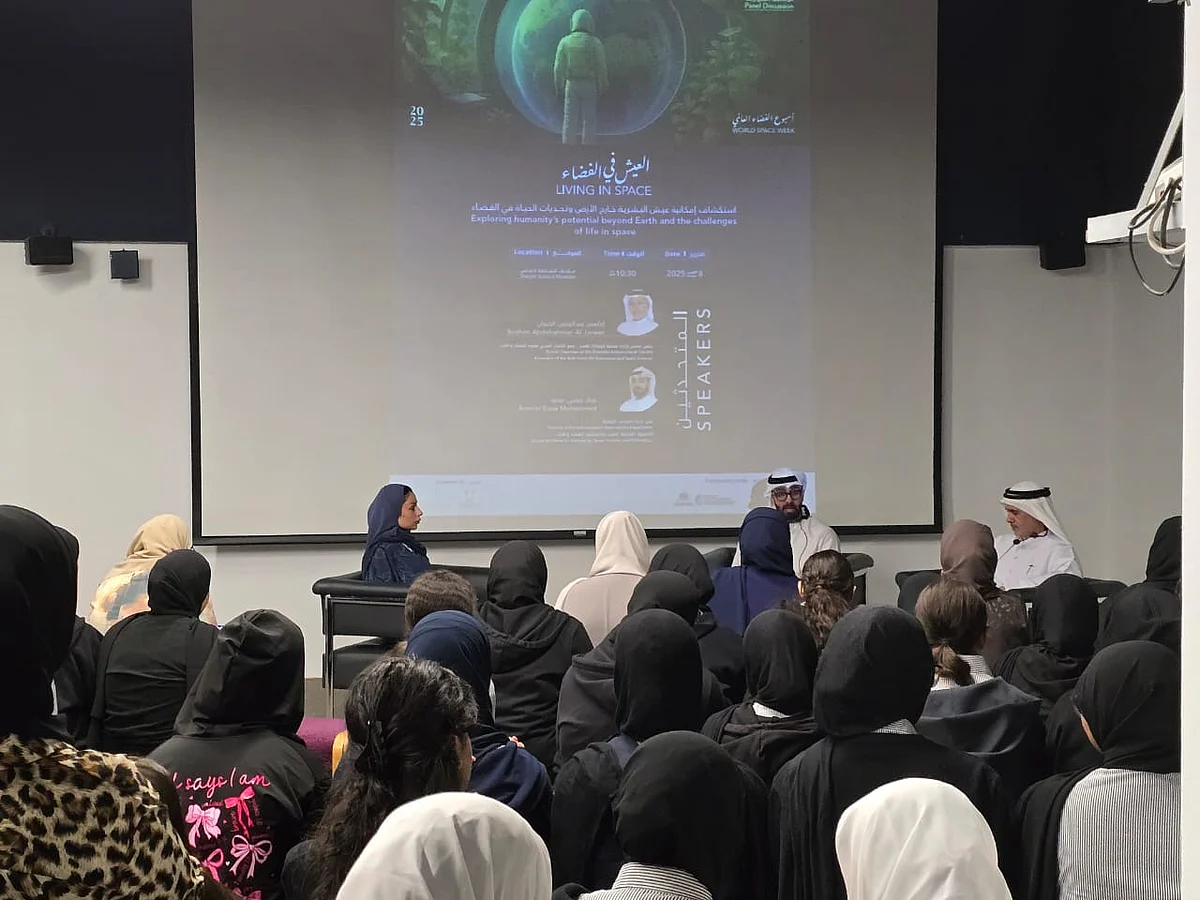
UAE: Could Humans Live On An Exoplanet? Experts Explore Possibilities
Scientists have found tentative evidence that a world orbiting another star may be home to life - and researchers in the UAE say that, while far-fetched today, living on an exoplanet might not be impossible in the future.
For the uninitiated, an exoplanet is a planet that orbits a star outside the solar system.
Recommended For You Dubai student's campaign gives 15,000 children across India the gift of sightCelebrating the World Space Week at the Sharjah Science Museum, a session titled 'Exploring humanity's potential beyond Earth and the challenges of life in space' saw experts converge in the museum to discuss breakthroughs in space research, the future of human habitation beyond Earth, and the UAE's growing role in advancing space exploration and astrobiology.
Stay up to date with the latest news. Follow KT on WhatsApp Channels.
New discoveriesRecently, astronomers confirmed a planet called 'L 98-59 f', orbiting a red dwarf about 35 light-years from Earth. They found it lies in its star's“habitable zone” - the region where, under the right conditions, liquid water could exist.
Another world, 'K2-18 b', has been studied with the James Webb Space Telescope (JWST). Scientists have detected chemicals in its atmosphere - including dimethyl sulfide (DMS) and dimethyl disulfide (DMDS) - molecules on Earth associated with marine microbes. These are considered potential biosignatures.
However, the evidence is still preliminary; alternative non-biological explanations are possible, and the statistical confidence does not yet reach fully conclusive levels.
Can humans live on an exoplanet?Speaking on the sidelines of the event, Ammar Eissa Mohammed, Director of the Astronomical Observatories Department at Sharjah Academy for Astronomy, Space Sciences and Technology, said the following:
“When we move from the familiar planets of the solar system to exoplanetary systems, the idea sounds far-fetched. If someone a hundred years ago said we'd detect evidence of exoplanets, many would dismiss it. As of now, our knowledge and resources are limited, but who knows, in the future, it might not be entirely impossible that we could live on an exoplanet.”
He pointed out several challenges:
“Microgravity is one of them. We are not adapted to impacts of zero or very low gravity. Astronauts aboard the International Space Station (ISS) lose bone density, muscle mass, and other bodily functions degrade in such environments. On celestial bodies like the Moon or Mars (or further out), keeping physical health would require strenuous countermeasures.”
He explained sustaining food production to live outside of Earth would require a regenerative, closed-loop system.“Shipping everything from Earth is near impossible. Latency (in transporting goods or information) and limited capacity make it a considerable problem.”
UAE scientists and educational outreachMeanwhile, students from different schools in the emirate, congregated at the museum to attend lectures, participate in planetary science workshops and attend galaxy tours.
Muna Al Mulla, Senior Instructor at the Sharjah Science Museum, emphasized that programs like 'Space Dialogues' help students learn about discoveries in space and astronomy, inspiring them toward careers in these fields.
“The 'Space Dialogues' sessions organized by the Sharjah Science Museum provide a valuable platform for students and future generations to explore the world of space and science. Students can learn about the latest discoveries and innovations in the field of space and astronomy, inspiring them to pursue their interests in science and space, and choose career paths in these inspiring fields.”
Experts at the event also echoed how such initiatives not only spark curiosity but also strengthen the UAE's growing footprint in space research and exploration.
Ibrahim Abdelrahman Al Jarwan, Board Chairman of the Emirates Astronomical Society, said,“Public awareness and education are crucial. The UAE is already recognized among leading space-faring nations alongside countries such as India, China, Brazil, Europe and Russia, and teaching the younger generation helps sustain and build that reputation.”

Legal Disclaimer:
MENAFN provides the
information “as is” without warranty of any kind. We do not accept
any responsibility or liability for the accuracy, content, images,
videos, licenses, completeness, legality, or reliability of the information
contained in this article. If you have any complaints or copyright
issues related to this article, kindly contact the provider above.

















Comments
No comment